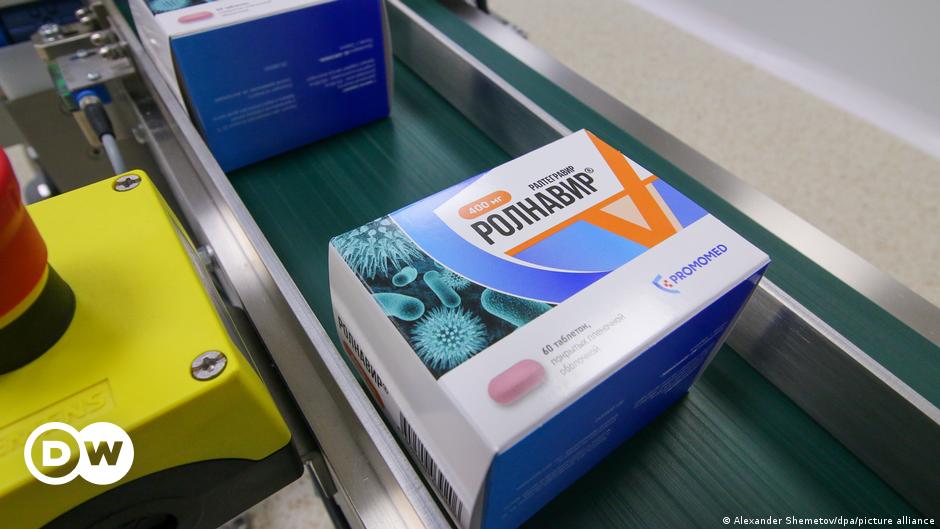Last month, patients at Moscow's Center for Prevention and Control of HIV/AIDS were warned on their website that pharmacies in the Russian capital were no longer dispensing the antiretroviral drug dolutegravir.
This is not the only HIV drug that is not available.
Novaya Gazeta Europe, an independent Russian news site, reported in November that patients had already reported 400 cases of drug shortages on the Disruptions website, which monitors the availability of HIV and hepatitis treatments in Russia. “I'm doing it,” he wrote.
The news site estimated that health facilities had cut procurement for nearly half of all available HIV drugs and had completely stopped supplying 13 drugs.
uncontrollable epidemic
More than 1.13 million people in Russia are thought to be infected with human immunodeficiency virus (HIV), which can cause acquired immunodeficiency syndrome (AIDS).
Ekaterina Stepanova, a doctor at a private clinic in Russia, said the real number is probably much higher.
“There are currently more than 27 regions with HIV epidemics,” he said. “This means that more than 1% of all pregnant women have tested positive for HIV. This is terrible. It shows how widespread the virus is throughout Russia.”
Only about 52% of all registered patients receive their medication for free. Instead, their status as HIV-infected people must be registered and recorded in a database.
Many do not want to be registered – they are afraid discrimination and social exclusion. AIDS remains a taboo topic in Russia.
This is not only due to a lack of information, but also the stigma associated with this virus. Many people believe that only homosexuals, sex workers, and drug addicts can get HIV.
In society, these groups are widely stigmatized; be liable for criminal prosecution.
“So it is very difficult to work with these groups,” Dr. Stepanova told DW.
prejudice and ignorance
Alexei is one of the few Russians who is open about his infection. Although he lives in Moscow, he still remembers the day he was diagnosed.
“I found out through my biological mother that I had been infected since birth when I was eight years old. I was hospitalized at the time. [something else], and they discovered it by accident. I didn't think much of it at the time. I was a child with no preconceptions. ”
He lived in several foster homes until he was 14 years old. At first, I didn't notice any discrimination due to infection. It was only later that he realized that he was being treated special.
“When I was a kid, I always wondered why I always took my cutlery, plates and cups with me when I moved into a nursing home. In fact, I liked it. I thought it was because I was diagnosed with HIV. I didn't realize it until later.”
However, he believes this was not done out of malice, but because those responsible did not know much about the virus.
Nevertheless, Alexei experienced discrimination later in life and was deeply hurt.
“One time I was at a bar with some friends and I told them about my HIV status,” he told DW. “They asked me which glass I drank it in so there wouldn't be any confusion. For some reason, it hurt so much that I started crying.”
HIV is not easily transmitted from person to person. The virus lives in the blood and some body fluids. In most cases, body fluids from an HIV-infected person must enter the bloodstream directly through open wounds or mucous membranes, for example during unprotected sex.
there is a shortage of medicines
Of course, you also have the option of receiving treatment at a private clinic. However, patients must pay for the medication themselves. Usually this costs him from 4,000 to 9,000 Russian rubles (44-98 dollars or 40-90 euros), but not everyone can afford this amount.
“Most of the time, my patients buy their own medicines,” Stepanova said. “Those who are getting free treatment or have the extra money to buy it can bring it and distribute it to those who don't have it. We look out for each other. .”
But why are medicines so scarce? International Sanctions against Russia We will make clear exceptions for life-saving medicines. Cheap Russian generic drugs are also available. But even these are not enough to treat everyone infected with HIV in Russia.
One possible explanation is that the Russian Ministry of Health's funding for HIV drugs has stagnated for years, even as the number of infected people increases. Russia has poured in funds earmarked for 2022 and 2023 to cover drug costs in 2021, according to the International Coalition for Treatment Readiness, an NGO fighting for universal access to HIV treatment.
Most of Russia's funds are currently war in ukraine It will only make the situation worse.
To make matters worse, Russia's population is growing, which means that HIV numbers are also rising. In September 2022, the illegally annexed territory in the east ukraine, Kherson, Luhansk and Zaporizhia were declared Russian territory. This means that Russia technically counts the 11 million people living there as part of its healthcare system.
By the end of 2023, approximately 60,000 new HIV infections are expected to occur in Russia.
This article was originally written in German.

